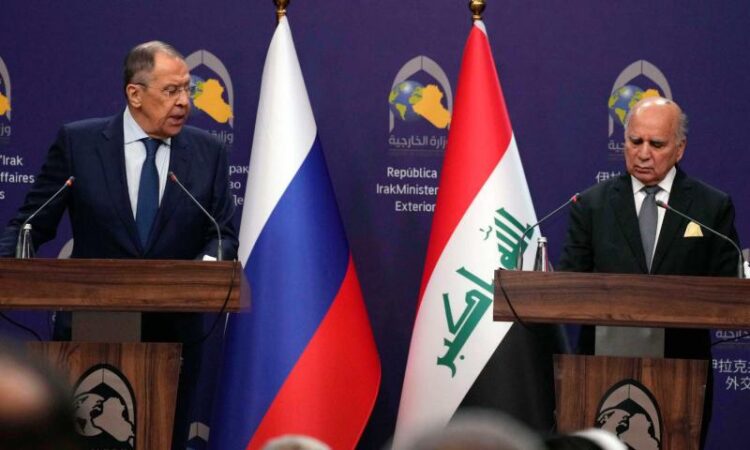
BAGHDAD-
Talks in Baghdad by visiting Russian Foreign Minister Sergey Lavrov focused on the obstacles posed by US sanctions for the development of Russian-Iraqi economic cooperation.
During his visit, on Monday Lavrov met Iraqi Prime Minister Muhammad Shiaa al-Sudani and President Abdul Latif Rashid, as well as his Iraqi counterpart Fuad Hussein.
Discussions are said to have focused on ways to develop economic relations despite the US sanctions.
The Iraqi foreign minister said he will consult with US officials this week on how to pay dues owed to Russian oil companies, considering US sanctions currently in place.
“We will discuss this problem with the American side. There are sanctions in place that should not be imposed on the Iraqi side because the cooperation with Russian companies is ongoing and there are active Russian companies in Iraq,” Hussein said during a news conference with Lavrov in Baghdad.
Lavrov said that “in light of the current conditions created by the illegal restrictions imposed by the Americans and their satellites, it is very important to protect legal economic relations from illegal pressures from the West.”
Russian investments in Iraq are believed to be worth more than $10 billion, mostly in the oil industry. Hussein said that one of the main issues he and Lavrov talked about was how to pay bills owed to Russian energy companies such as Lukoil and Gazprom which do business in Iraq even though Russia is under international sanctions.
The goal is to “protect Iraqi banks and central banks from sanctions”.
Iraq’s foreign minister is due to fly to the United States on Wednesday to discuss recent tight regulations imposed by the New York Federal Reserve on international dollar transactions by commercial Iraqi banks and their impact on Iraq’s economy, official sources said.
Hussein admitted there are “due payments” from Iraq to Russian oil and gas companies operating in the country, without disclosing their total amount.
Speaking alongside Lavrov, he added, “We discussed how to deal with these financial dues in light of the sanctions imposed on Russia and in light of the protective measures of Iraqi banks and the Central Bank.”
The United States has imposed strict restrictions on dollar transfers to Iraqi banks, with the aim of preventing such transfers to countries under US sanctions such as Iran, Syria and Russia.
The restrictions have led to a financial crisis in Iraq, with the rise in the exchange rate of the dollar at the expense of the local currency, which resulted in a high inflation rate and the atrophy of the purchasing power of Iraqis.
Analysts believe that the Iraqi delegation faces a tough challenge persuading Washington of the need to ease its restrictions. The Biden administration is also expected to make new demands especially in relation to the Kurdistan region, as well as Iran and Russia.
The West, previously Russia’s main energy market, has targeted Moscow’s energy revenues through sanctions that also restrict sales to third countries and are set to tighten further.
Hussein stated during the joint press conference with Lavrov that Iraq is calling for peaceful solutions and encouraging dialogue between Russia and Ukraine to end the war.






